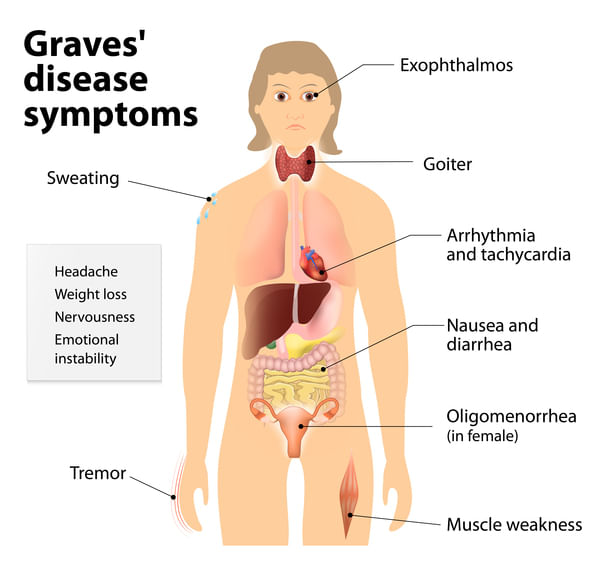Treatment of Graves Disease!
Treatment of Graves’ disease
Homeopathic Treatment of Graves’ disease
Acupuncture & Acupressure Treatment of Graves’ disease
Psychotherapy Treatment of Graves’ disease
Conventional / Allopathic Treatment of Graves’ disease
Surgical Treatment of Graves’ disease
Dietary & Herbal Treatment of Graves’ disease
Other Treatment of Graves’ disease
What is Graves’ disease
Symptoms of Graves’ disease
Causes of Graves’ disease
Risk factors of Graves’ disease
Complications of Graves’ disease
Lab Investigations and Diagnosis of Graves’ disease
Precautions & Prevention of Graves’ disease
Treatment of Graves’ disease
Homeopathic Treatment of Grave’s Disease
Homeopathy relieves both physical and psychological complaints of Grave’s disease. It balances hormone level. It treats the person as a whole. Treatment is constitutional. It means that homeopathic treatment focuses on the patient as a person, as well as his pathological condition. It balances the energy system, improves immunity and body functions. It naturally cures the root cause of disorder. Some of the homeopathic medicines for treatment of grave’s disease are:
Amyl nit
Iodium
Kali iod
Nat mur
Thyroid
Acupuncture and Acupressure Treatment of Grave’s disease
The response to acupuncture therapy is very promising. In acupuncture therapist will first diagnose the energy blocks in your body and based on this diagnosis will select specific acupoints to treat the condition.
Conventional / Allopathic Treatment of Graves’ disease
In the allopathic Treatment of Graves’ disease, Anti-thyroid medications such as propylthiouracil and methimazole are prescribed. Beta blockers such as Propranolol, Atenolol, Metoprolol, and Nadolol are also given.
Surgical Treatment of Graves’ disease
Surgery is used to remove your thyroid (thyroidectomy). After the surgery, you’ll likely need treatment to supply your body with normal amounts of thyroid hormones. If your symptoms are more severe, your doctor may recommend:
Orbital decompression surgery
Eye muscle surgery
Dietary & Herbal Treatment of Graves’ disease
Eat fruits, vegetables and whole grains
Eat low-fat milk and milk products
Limit salt and added sugars
Limit foods with saturated fats and trans fats
Other Treatment of Graves’ disease
If you have Graves’ ophthalmopathy:
Apply cool compresses to your eyes
Wear sunglasses
What is Graves’ disease?
Graves’ disease is an autoimmune disorder that leads to overproduction of the thyroid hormones (hyperthyroidism). Graves’ disease is rarely life-threatening.
Symptoms of Graves’ disease
Anxiety
Irritability
Difficulty sleeping
Fatigue
Weight loss
Erectile dysfunction
Breast enlargement in men
A rapid or irregular heartbeat
Menstrual irregularities in women
A fine tremor of your hands or fingers
An increase in perspiration or warm, moist skin
Sensitivity to heat
Enlargement of your thyroid gland (goiter)
Frequent bowel movements or diarrhea
Bulging eyes
Thick, red skin usually on the shins or tops of the feet
Causes of Graves’ disease
It is caused by an abnormal immune system response that causes the thyroid gland to produce too much thyroid hormones.
Risk factors of Graves’ disease
Family history of Graves’ disease
Being women
People younger than 40
Emotional or physical stress
Pregnancy or recent childbirth
Cigarette smoking
Complications of Graves’ disease
Pregnancy complications
Thyroid storm
Heart disorders
Brittle bones
Diagnosis of Graves’ disease
Diagnosis of Graves’ disease involves the following tests:
Physical exam
Blood tests
Radioactive iodine uptake
CT scan and MRI



+1.svg)
